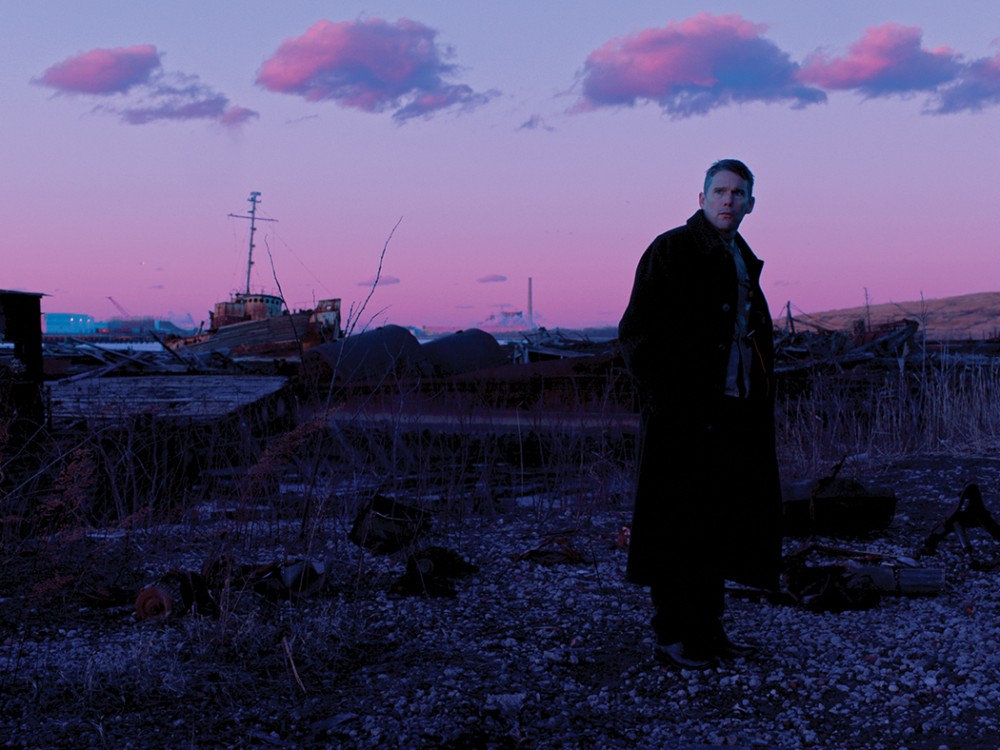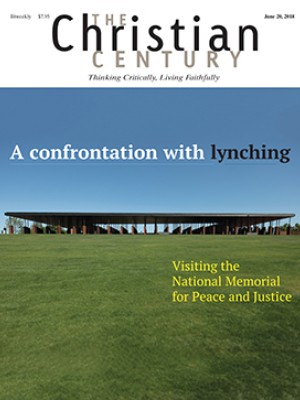The spiritual desert of First Reformed's minister
Ernst Toller is not so different from the male anti-heroes at the heart of Paul Schrader's earlier, more sensational films.

“The Christian life is full of discernment,” says the Reverend Ernst Toller (Ethan Hawke), pastor of a 250-year-old church in a small town in upstate New York. These are words he is writing in his journal, spoken as a voice-over while we watch him pour Drano down a clogged toilet. Paul Schrader’s film First Reformed is replete with these juxtapositions: quotidian details of an ascetic life overlaid with expressions of spiritual anguish, self-scrutiny, and sometimes wisdom.
Schrader became famous for writing Martin Scorsese’s early films Taxi Driver and Raging Bull, master works showing masculine anxiety wrapped in violence. He is also the son of a strict Calvinist pastor and a graduate of Calvin College. Though he has openly left the church and the faith, he is still fascinated by them and by the pastoral vocation.
Read our latest issue or browse back issues.
Toller is not so different from the male antiheroes at the heart of Schrader’s earlier, more sensational films. He is obsessed with just how much whole-hearted commitment a spiritual vocation demands. This is Schrader’s quietest film, literally and emotionally, but he has invested its core questions of spiritual meaning and faithfulness with deadly seriousness.
Schrader’s stripped-down visual style matches his subject. Toller is experiencing a dark night of the soul, inhabiting a spiritual desert so dry that it desiccates the world around him. He has shrunk the spacious colonial parsonage into a tiny monastic cell, using only a sparsely furnished bedroom, a bare bathroom whose unadorned porcelain fixtures feel cold to look at, and a living room with one shabby, uninviting hardback chair set off at an angle from the barren fireplace. He allows himself no comfort except for the whiskey he drinks all day (which may be killing him more than consoling him).
Toller carries guilt from events that happened before the story begins, and there is no small measure of self-inflicted punishment in his asceticism. But self-denial is also part of his effort to nurture a richer inner life—a gamble that the spirit will compensate for what’s lacking in the flesh. Toller starts the journal as a spiritual discipline, a prelude to prayer or maybe as a form of prayer itself. As he says, quoting Thomas Merton one of many times, “the desire to pray is itself a form of prayer.”
Change begins for Toller when he is visited by a pregnant parishioner, Mary (Amanda Seyfried), and her husband, Michael (Philip Ettinger). Michael is a radical environmentalist who despairs about bringing new life into the world in the face of ecological apocalypse. His conviction startles Toller, who has forgotten that anything can have life-and-death stakes. When Michael commits suicide, Toller picks up the pieces of the other man’s life and cause.
As he takes on more of Michael’s vision and mission, Toller grows disenchanted with the political and economic compromises that keep his ministry afloat. Those compromises are represented by Abundant Life, the megachurch down the road. When First Reformed nearly closed, a wealthy parishioner at Abundant Life donated enough money to pay Toller’s salary and keep the church open. Abundant Life oversees First Reformed’s finances and lends out its choir for important liturgical events. Abundant Life’s minister, Joel Jeffers (Cedric Kyles), acts as a pastor to Toller, who desperately needs one.
This story could easily become a caricature, in which the uncompromising puritanism of First Reformed is set against the easygoing spiritual consumerism of nondenominational evangelicalism. The film resists this approach. Jeffers is wise about the work he is doing, aware of its compromises, faithful to his own sense of God’s call, and a genuine pastor to his flock. He has made his own gamble that a compromised church is better than no church at all. Toller begins to recoil from Jeffers’s vision as he is drawn to what seems to him an uncompromised and faithful enactment of God’s justice in the world.
In his first and only meeting with Michael before the suicide, Toller tells him that the whole of faith is the paradoxical work of holding both hope and despair together. He argues that while Michael’s cause for despair might be new—the imminent collapse of the planet—the inner blackness is as old as humanity itself. Christianity, for Toller, is the practice of balancing on the knife’s edge between despair and hope. Whether Toller is finding or losing his faith, purifying the church or destroying it, losing his mind or seeing the truth, is a matter left for our discernment.
The movie ends with a breathtaking scene that feels like an epiphany. I was not sure if it was depicting fantasy or reality within the film, and this too feels like a call to discernment. I think the scene is meant to have happened and that Schrader has a genuine vision: the balance that Toller has been trying to achieve through self-mortification and self-scrutiny can only come through connection with another human being. Hope and despair are held together not in the mind but in the delicate tension between two bodies, two selves, trying desperately to merge.
Schrader both takes seriously the theological beliefs that animate Toller’s spiritual journey and refuses to judge whether they are true. In this sense, he has given us a new kind of church movie in which the question is not so much “Is faith reasonable?” but “What kind of self does faith make?” Schrader may not believe in the God Toller seeks to pray to, but First Reformed suggests that he does believe in the longing to pray. If Merton is right, maybe that is enough.
A version of this article appears in the print edition under the title “A pastor’s spiritual desert.”






